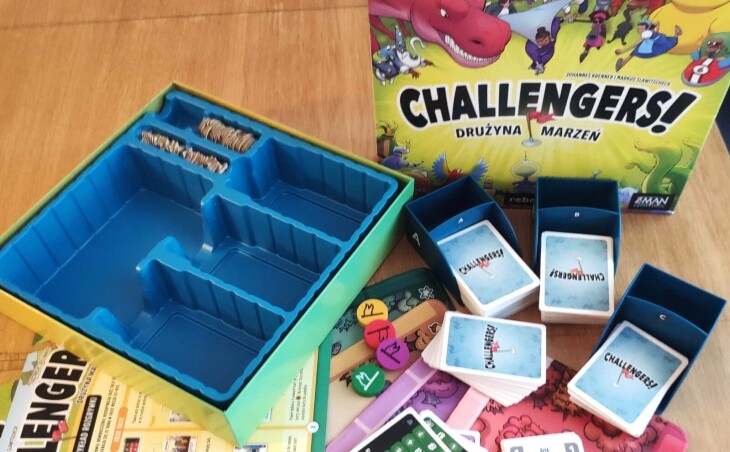Challengers is an unusual game – many players will be put off after learning the rules or the first game. Others will have a great time with it. Where do these extremes come from?
The game consists of seven rounds and a grand final in which we will choose the winner. Each round is divided into two phases: deck development and combat – a duel in which we want to capture the flag. We start the game with a basic deck, to which we will add cards with greater strength and with special rules. In a single game, we will use five of the six sets of cards that focus on different abilities. Depending on the round number, cards from different levels will be available to us – the strongest ones will be obtained at the very end.
After building the deck, we will go to the arena – which of the opponents we face depends on the appropriate order card. The game has a system that will prevent us from constantly dueling with the same player. The combat itself consists of revealing the cards from the top of the deck until their total strength is equal to or greater than the strength of the opponent’s card. When this happens, take the wooden flag marker and place it on the last card you played. The opponent places his defeated cards on the bench and now he will try to take the flag from us.
The fight ends when one of the players will no longer be able to match the strength of the opponent’s card, or when we are forced to put a card on the bench, and it will be full (there is room for six different cards). In this second part of the game, we have no influence on the order in which the cards are played – when attacking, we add more cards from the top of our deck. This randomness is especially severe for cards that will give us more when played early (e.g. +1 Strength for subsequent cards in a set) or late (e.g. bonus points if it was our last or penultimate card in waist).
Some of the card’s special abilities can reduce this randomness by allowing you to put cards in the order you choose, or to move some cards to the top or bottom of the deck. These aren’t common effects, so we rather have to accept the lack of impact on this part of the game – which is the biggest complaint directed at Challengers .
The game is like a classic war game. The deck expansion phase gives some room for maneuver – we choose one or two cards from five, which do not have to match the ones we chose earlier. As a result, we can’t count on creating a strong synergy of effects or hitting the card we need. This makes even the first half of the game a little dependent on us. So we have random deck building and then a duel that plays itself out.
So where is the game here? You have to look at the Challengers more broadly. The game uses simple mechanics and the concept of automatic combat so as not to engage us fully. During the game, we can talk freely, consume drinks, play at our own pace. Dividing the group, even eight people, into dueling pairs allows you to quickly select the winner. The game cleverly does not allow itself to be prolonged, because by limiting the space on the bench, the players’ decks cannot be too extensive. Hence, one round of the duel is always about twenty cards. The simple way of choosing cards for the deck (no market, no draft, no requirements to meet) also increases the smoothness of the game. The game has been intentionally designed to be a fast, simple and exciting tournament.
In addition, the workmanship is at a very high level – in the box, in addition to coated cards, we will find rubberized mats and plastic card feeders. When playing with an odd number of players or solo, we will use the deck of a neutral opponent in the game. If we are looking for a pleasant, simple and non-involving entertainment for a larger number of players – Challengers may be the game for us.
Nasza ocena: 8.3/10
A simple and fun game for more players.REPLAYABILITY: 8/10
PRODUCTION QUALITY: 10/10
PLAYABILITY: 8/10

